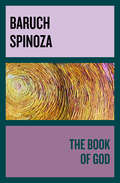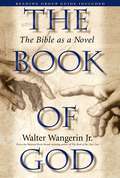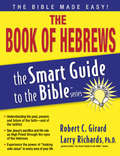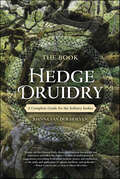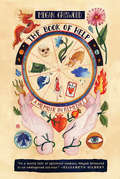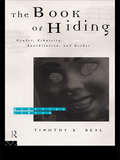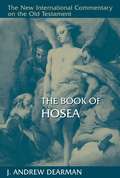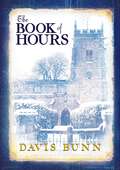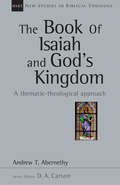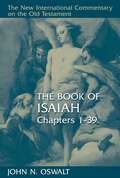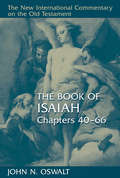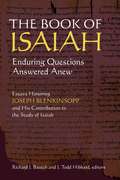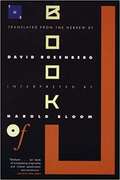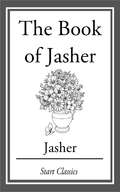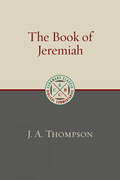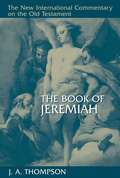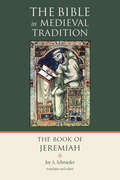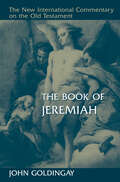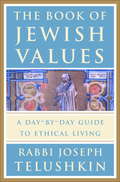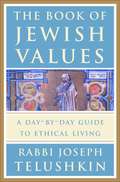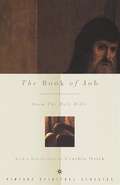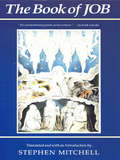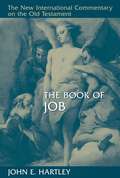- Table View
- List View
The Book of God
by Baruch SpinozaTranslated by Dr. A. Wolf from the Dutch [version of the author&’s Tractatus de Deo et homine] and edited and with an introduction by Dagobert D. Runes. Spinoza is today considered the Philosopher of Modern Times, as Aristotle was the Philosopher of Antiquity. In spite of which, he remains the best known and least read of the great thinkers.The Book of God, one of his earliest works, came to light only a hundred years ago in two slightly varying Dutch manuscripts. Its youthful author lived in turbulent times, when the Western world was torn by civil and religious strife, and bullies, bigots and pseudo-prophets vied for the ear of a fearful people. While Europe was in an uproar over the right church, Spinoza was seeking the right God. This book is the first known report of his findings. Appearing like a draft for his later Ethics, it is a Guide for the Bewildered. Those who see in philosophy no more than an intellectual exercise will have no difficulty dismissing it. But those imbued with the longing for a better and freer life will find here a most rewarding fountain of faith.
The Book of God
by Baruch SpinozaTranslated by Dr. A. Wolf from the Dutch [version of the author&’s Tractatus de Deo et homine] and edited and with an introduction by Dagobert D. Runes. Spinoza is today considered the Philosopher of Modern Times, as Aristotle was the Philosopher of Antiquity. In spite of which, he remains the best known and least read of the great thinkers.The Book of God, one of his earliest works, came to light only a hundred years ago in two slightly varying Dutch manuscripts. Its youthful author lived in turbulent times, when the Western world was torn by civil and religious strife, and bullies, bigots and pseudo-prophets vied for the ear of a fearful people. While Europe was in an uproar over the right church, Spinoza was seeking the right God. This book is the first known report of his findings. Appearing like a draft for his later Ethics, it is a Guide for the Bewildered. Those who see in philosophy no more than an intellectual exercise will have no difficulty dismissing it. But those imbued with the longing for a better and freer life will find here a most rewarding fountain of faith.
The Book of God: The Bible as a Novel
by Walter Wangerin Jr.The Bible as a Single, Powerful Story. Here is the entire story of the Bible, narrated by master storyteller Walter Wangerin Jr. Reading like a great historical novel, The Book of God dramatizes the sweep of biblical events, making the men and women of this ancient book come alive in vivid detail and dialogue. From Abraham wandering in the desert to Jesus teaching the multitudes on a Judean hillside, The Book of God follows the biblical story in chronological order. Priests and kings, apostles and prophets, common folk and charismatic leaders--individual stories offer glimpses into an unfolding revelation that reaches across the centuries to touch us today. Wangerin recreates the high drama, low comedy, gentle humor, and awesome holiness of the Bible story. Imaginative yet meticulously researched, The Book of God offers a sweeping history that stretches across thousands of years and hundreds of lives, in cultures foreign and yet familiar in their common humanity. History and fact take on personality and warmth. Wangerin shows you human hands--Abraham raising the knife over his son Isaac on Mount Moriah, a priest offering incense in the temple at Jerusalem, Joseph the carpenter at work with his tools. He shows you human faces--Moses and Aaron face-to-face with the king of Egypt, Mary smiling like a white rose, and Jesus laughing with a Samaritan woman. Gardens, humble homes, olive groves, palaces, temples, and the hills of Judea shining in the afternoon sun--Wangerin makes the places where the events of the Bible took place come to life in the imagination. Wangerin helps you understand what it was like for each person to be caught up in the events of a particular time and place--a time and place where the eternal God somehow reached out and touched ordinary men and women. The book of God is no ordinary book. Written by a born storyteller, it is the magnum opus of one of the most respected and beloved authors of our time.
The Book of Hebrews
by Robert GirardMore than any other New Testament book, Hebrews helps you understand the pivotal relationship between the Old and New Testaments. Yet some of the ancient-and most foundational-concepts of our faith can be difficult to understand here in the 21st century. With The Smart Guide to the BibleTM: The Book of Hebrews, you'll discover the power of being inseparably linked with the historic, living Savior, who is the same yesterday, today, and forever. Be Smart About:The Foundations of ChristianityThe Jewish Sacrificial SystemThe Power of JesusJesus as High PriestThe Position of JesusThe Work of the Holy SpiritAnd More!
The Book of Hedge Druidry: A Complete Guide for the Solitary Seeker
by Joanna van der Hoeven“Useful practical suggestions; everything from ritual creation, prayer, and meditation to the study and application of ogham, herblore, and spellcraft.” —Philip Carr-Gomm, author of Druid MysteriesThe Book of Hedge Druidry is for those who feel called to explore a powerful earth-based spirituality rooted in Celtic lore. With hands-on practices as well as fascinating perspectives on what it means to be a Druid, this book walks you through the magic of the liminal realm and helps you fill your own cauldron of inspiration.Longtime Druid Joanna van der Hoeven guides you in creating an altar and crafting rituals based on the Wheel of the Year and important life passages. You will discover enchanting moon rites and ideas for daily practice as well as insights for working with herbs, spells, and the ogham alphabet. When you step onto the Hedge Druid’s path, you learn to work with the in-betweeen places, straddling the boundary between this world and the next and developing profound relationships with ancestors, goddesses, gods, spirits of place, and the Fair Folk.Druidry is a powerful tradition that evokes the mystical spirit of times past. This comprehensive guide to solitary Druidry will connect you to a higher wisdom for the benefit of all.“Joanna van der Hoeven . . . offers insightful practices, heartfelt rituals, powerful tools, and resonant meditations that are infused with tradition and informed by experience; clearly Joanna has walked the pathways she now illuminates for others to explore as well!” —Jhenah Telyndru, author of The Ninefold Way of Avalon
The Book of Help: A Memoir in Remedies
by Megan GriswoldThe Book of Help traces one woman’s life-long quest for love, connection, and peace of mind. A heartbreakingly vulnerable and tragically funny memoir-in-remedies, Megan Griswold’s narrative spans four decades and six continents –– from the glaciers of Patagonia and the psycho-tropics of Brazil, to academia, the Ivy League, and the study of Eastern medicine. Megan was born into a family who enthusiastically embraced the offerings of New Age California culture –– at seven she asked Santa for her first mantra and by twelve she was taking weekend workshops on personal growth. But later, when her newly-wedded husband calls in the middle of the night to say he’s landed in jail, Megan must accept that her many certificates, degrees and licenses had not been the finish line she’d once imagined them to be, but instead the preliminary training for what would prove to be the wildest, most growth-insisting journey of her life.
The Book of Hiding: Gender, Ethnicity, Annihilation, and Esther (Biblical Limits)
by Timothy K. BealThe Book of Hiding offers a fluent and erudite analysis of the parallels between the Bible and contemporary discussions of gender, ethnicity and social ambiguity. Beal focuses particularly on the traditionally marginalised book of Esther, in order to examine closely the categories of self and other in relation to religion, sexism, nationalism, and the ever-looming legacies and future possibilities of annihilation. Beal applies the critical tools of contemporary theorists, such as Cixous, Irigaray and Levinas, challenging widely held assumptions about the moral and life-affirming message of Scripture and even about the presence of God in the book of Esther. The Book of Hiding draws together a variety of different perspectives and disciplines, creating a unique space for dialogue raising new questions and reconsidering old assumptions, which is profoundly interesting and well-articulated.
The Book of Hosea (New International Commentary on the Old Testament (NICOT))
by J. Andrew DearmanHere J. Andrew Dearman considers the historical context of the prophetic figure of Hosea, his roots in the prophetic activity and covenant traditions of ancient Israel, and the poetic and metaphorical aspects of the prophecy. This historical and theological commentary is a welcome addition to the NICOT series.
The Book of Hours: Hardcover edition features newly revised content
by Davis BunnCastle Priory is a crumbling Oxfordshire mansion, one Brian Blackstone's wife considered a place of extraordinary enchantment. But for Brian there is no enchantment, only the burden of trying to honor Sarah's dying wish that he hold onto the property.With the local doctor, Cecilia Keeble, Brian begins to explore the mysteries of the old estate. In the process he discovers a medieval secret which offers a key to renew his spirit and heal his broken heart. The power of prayer reaches through the centuries in a surprising and mysterious way...
The Book of Isaiah and God's Kingdom: A Thematic-Theological Approach (New Studies in Biblical Theology #Volume 40)
by Andrew AbernethyThe book of Isaiah has nourished the church throughout the centuries. However, its massive size can be intimidating; its historical setting can seem distant, opaque, varied; its organization and composition can seem disjointed and fragmented; its abundance of terse, poetic language can make its message seem veiled—and where are those explicit prophecies about Christ? These are typical experiences for many who try to read, let alone teach or preach, through Isaiah. Andrew Abernethy's conviction is that thematic points of reference can be of great help in encountering Isaiah and its rich theological message. In view of what the structure of the book of Isaiah aims to emphasize, this New Studies in Biblical Theology volume employs the concept of "kingdom" as an entry point for organizing the book's major themes. In many respects, Isaiah provides a people living amidst imperial contexts with a theological interpretation of them in the light of YHWH's past, present and future sovereign reign. Four features of "kingdom" frame Abernethy's study: God, the King; the lead agents of the King; the realm of the kingdom and the people of the King. While his primary aim is to show how "kingdom" is fundamental to Isaiah when understood within its Old Testament context, interspersed canonical reflections assist those who are wrestling with how to read Isaiah as Christian Scripture in and for the church. Addressing key issues in biblical theology, the works comprising New Studies in Biblical Theology are creative attempts to help Christians better understand their Bibles. The NSBT series is edited by D. A. Carson, aiming to simultaneously instruct and to edify, to interact with current scholarship and to point the way ahead.
The Book of Isaiah, Chapters 1–39 (The\new International Commentary On The Old Testament Ser.)
by John N. OswaltThe first of John N. Oswalt's two-part study of the book of Isaiah for the NICOT series, this commentary on chapters 1û39 combines theological acumen, literary sensitivity, philological expertise, and historical knowledge to present a faithful and accurate reading of one of the Old Testament's most important books. In the introduction to this work, Oswalt considers Isaiah's background, unity of composition, date and authorship, canonicity, Hebrew text, theology, and problems of interpretation, and he offers a select bibliography for further research. Oswalt also provides substantial discussions of several issues crucial to the book of Isaiah. He notes, for example, that scholars often divide Isaiah into three divisions, with chapters 1–39 addressing Isaiah's contemporaries in the eighth century B.C., chapters 40–55 presupposing the exile of the sixth century, and chapters 56–66 presupposing the eventual return from exile. While taking this scholarship into account Oswalt defends the unity of the prophetic book and argues convincingly that the whole book can be attributed to the Isaiah of the eighth century. The commentary proper, based on Oswalt's own translation of the Hebrew text, provides pastors, scholars, and students with a lucid interpretation of the book of Isaiah in its ancient context as well as an exposition of its message for today.
The Book of Isaiah, Chapters 40–66 (The New International Commentary on the Old Testament)
by John N. OswaltThis long-anticipated work completes John Oswalt's two-volume commentary on the book of Isaiah. After opening with a valuable discussion on the state of Isaiah studies today, Oswalt provides an insightful verse-by-verse explanation of Isaiah 40-66, giving special attention to the message of the prophet not only for his own time but also for modern readers.
The Book of Isaiah: Enduring Questions Answered Anew
by Richard J. Bautch J. Todd HibbardA fresh window on Isaiah studies today Representing the highest echelon of Isaiah studies, this volume explores distinct issues that arise from the critical study of the text of Isaiah. The contributors acknowledge and comment on the exegetical contributions of distinguished biblical scholar Joseph Blenkinsopp, providing distinction and coherence to the collection. The publication between 2000 and 2004 of Blenkinsopp's 3-volume Anchor Bible commentary on Isaiah marked a significant development in Isaiah studies. Many of the articles and books now published in the field cite Blenkinsopp, testifying to how his commentary is influencing and helping shape the future direction of Isaiah studies. This volume, with its focus on his contributions, provides a fresh look at Isaiah studies in the twenty-first century.Contributors: Rainer Albertz Klaus Baltzer Hans M. Barstad Ulrich Berges Willem A. M. Beuken Philip Davies Hyun Chul Paul Kim Peter Marinkovic Andreas Schuele Jacob Stromberg Marvin A. Sweeney Lena-Sofia Tiemeyer Patricia K. Tull H. G. M. Williamson
The Book of J
by Harold BloomJ is the title that scholars ascribe to the nameless writer they believe is responsible for the text, written between 950 and 900 BCE, on which Genesis, Exodus and Numbers is based. In The Book of J, Bloom and Rosenberg draw the J text out of the surrounding material and present it as the seminal classic that it is. <p><p> In addition to Rosenberg's original translations, Bloom argues in several essays that "J" was not a religious writer but a fierce ironist and a woman living in the court of King Solomon. He also argues that J is a writer on par with Homer, Shakespeare and Tolstoy. <p> Bloom also offers historical context, a discussion of the theory of how the different texts came together to create the Bible, and translation notes. Rosenberg's translations from the Hebrew bring J's stories to life and reveal her towering originality and grasp of humanity.
The Book of Jasher
by JasherThe Book of Jasher covers the Mosaic period of the Bible presented in Genesis, Exodus, Numbers, Deuteronomy, and Joshua in greater detail and with explanations not found in the present Old Testament Documents. This apocryphal book of the Bible has been considered by some to be the original beginning to the Bible and is referenced in both the Book of Joshua and the Second Book of Samuel. Is not this written in the Book of Jasher?-Joshua, X. 13. Behold it is written in the Book of Jasher.-II. Samuel, I. 18
The Book of Jeremiah (Eerdmans Classic Biblical Commentaries (ECBC))
by J. A. ThompsonThe Old Testament prophets played a crucial role in the history of Israel. Although there were many prophets who brought the message of God to his people, we have recordsof only a few. Of these, our knowledge of Jeremiah is probably the most complete. In this commentary for scholars and pastors, originally part of the New International Commentary on the Old Testament, J. A. Thompson examines the book of Jeremiah with its message urging the people of Israel to be true to their covenant Lord and to live in conformity with his covenant requirements. Thompson begins his study by looking at the role of the prophets in Israel and at Jeremiah&’s place among them. He then discusses the historical setting of Jeremiah&’s message. From this background, Thompson moves to an examination of the book of Jeremiah itself, focusing on its structure and composition before considering some important issues for exegesis—the date of Jeremiah&’s call, the significance of the symbolic actions he performed, and the relationship between Jeremiah and Hosea. In the last part of his extensive introduction, Thompson examines the text and poetic forms of Jeremiah.
The Book of Jeremiah (New International Commentary On The Old Testament Ser.)
by J. A. ThompsonThompson's study on the Book of Jeremiah is part of The New International Commentary on the Old Testament. Like its companion series on the New Testament, this commentary devotes considerable care to achieving a balance between technical information and homiletic-devotional interpretation.
The Book of Jeremiah (The Bible in Medieval Tradition (BMT))
by Joy A. SchroederRetrieves rich historical biblical insights for readers of Jeremiah today In this volume, part of the Bible in Medieval Tradition series, Joy Schroeder provides substantial excerpts from seven noteworthy biblical interpreters who commented on Jeremiah between the ninth and fifteenth centuries. Following a survey of early and medieval Christian authors and their interpretive approaches, Schroeder offers original translations from medieval commentators writing on twenty-four chapters of Jeremiah, including all chapters present in major western lectionaries. In addition to her clear, readable renderings of texts from authors including Thomas Aquinas, Nicholas of Lyra, and Denis the Carthusian, Schroeder provides an introduction to each author represented, locating him within his historical and theological context. The well-chosen selections in this masterful volume illustrate the rich diversity of medieval approaches to biblical interpretation and offer an intriguing glimpse into the worldview of medieval commentators. MEDIEVAL AUTHORS REPRESENTED: Rabanus Maurus Rupert of Deutz Albert the Great Hugh of St. Cher Thomas Aquinas Nicholas of Lyra Denis the Carthusian
The Book of Jeremiah: The Book, The Man, The Message (New International Commentary on the Old Testament (NICOT))
by John GoldingayOf the Major Prophets, Jeremiah is perhaps the least straightforward. It is variously comprised of stories about the prophet Jeremiah, exchanges between Jeremiah and Yahweh, and messages directly from Yahweh—meaning a consciousness of form is essential to the understanding of its content. At times it is written in poetry, resembling Isaiah, while at other times it is written in prose, more similar to Ezekiel. And it is without doubt the darkest and most threatening of the Major Prophets, inviting comparisons to Amos and Hosea. John Goldingay, a widely respected biblical scholar who has written extensively on the entire Old Testament, navigates these complexities in the same spirit as other volumes of the New International Commentary on the Old Testament series—rooted in Jeremiah&’s historical context but with an eye always trained on its meaning and use as Christian Scripture. After a thorough introduction that explores matters of background, composition, and theology, Goldingay provides an original translation and verse-by-verse commentary of all fifty-two chapters, making this an authoritative and indispensable reference for scholars and pastors as they engage with Jeremiah from a contemporary Christian standpoint.
The Book of Jewish Values
by Rabbi Joseph TelushkinIn The Book of Jewish Values, Rabbi Joseph Telushkin has combed the Bible, the Talmud, and the whole spectrum of Judaism's sacred writings to give us a manual on how to lead a decent, kind, and honest life in a morally complicated world. Telushkin speaks to the major ethical issues of our time, issues that have, of course, been around since the beginning. He offers one or two pages a day of pithy, wise, and easily accessible teachings designed to be put into immediate practice. The range of the book is as broad as life itself: The first trait to seek in a spouse (Day 17)When, if ever, lying is permitted (Days 71-73)Why acting cheerfully is a requirement, not a choice (Day 39)What children don't owe their parents (Day 128)Whether Jews should donate their organs (Day 290)An effective but expensive technique for curbing your anger (Day 156)How to raise truthful children (Day 298)What purchases are always forbidden (Day 3)In addition, Telushkin raises issues with ethical implications that may surprise you, such as the need to tip those whom you don't see (Day 109), the right thing to do when you hear an ambulance siren (Day 1), and why wasting time is a sin (Day 15). Whether he is telling us what Jewish tradition has to say about insider trading or about the relationship between employers and employees, he provides fresh inspiration and clear guidance for every day of our lives.From the Hardcover edition.
The Book of Jewish Values: A Day-by-day Guide to Ethical Living
by Joseph TelushkinIn The Book of Jewish Values, Rabbi Joseph Telushkin has combed the Bible, the Talmud, and the whole spectrum of Judaism's sacred writings to give us a manual on how to lead a decent, kind, and honest life in a morally complicated world.
The Book of Job
by Cynthia Ozick Susan B. Varenne John F. ThorntonHow can a just God abandon His creatures to suffering? How do we reconcile our notions of divine goodness and omnipotence with the fact that the universe is visibly unfair? Sooner or later, these questions confront anyone who attempts to lead a life of faith. And nowhere have they been articulated with greater drama, poignancy, and despairing fury than in the Biblical parable of the blamelessly unfortunate Job.
The Book of Job
by Stephen MitchellThe theme of The Book of Job is nothing less than human suffering and the transcendence of it: it pulses with moral energy, outrage, and spiritual insight. Now, The Book of Job has been rendered into English by the eminent translator and scholar Stephen Mitchell, whose versions of Rilke, Israeli poetry, and the Tao Te Ching have been widely praised. This is the first time ever that the Hebrew verse of Job has been translated into verse in any language, ancient or modern, and the result is a triumph.
The Book of Job (The\new International Commentary On The Old Testament Ser.)
by John E. Hartley“In the Old Testament we read God’s word as it was spoken to his people Israel. Today, thousands of years later, we hear in these thirty-nine books his inspired and authoritative message for us.”These twin convictions, shared by all of the contributors to The New International Commentary on the Old Testament, define the goal of this ambitious series of commentaries. For those many modern readers who find the Old Testament to be strange and foreign soil, the NICOT series serves as an authoritative guide bridging the cultural gap between today’s world and the world of ancient Israel. Each NICOT volume aims to help us hear God’s word as clearly as possible.Scholars, pastors, and serious Bible students will welcome the fresh light that this commentary series casts on ancient yet familiar biblical texts. The contributors apply their proven scholarly expertise and wide experience as teachers to illumine our understanding of the Old Testament. As gifted writers, they present the results of the best recent research in an interesting manner.Each commentary opens with an introduction to the biblical book, looking especially at questions concerning its background, authorship, date, purpose, structure, and theology. A select bibliography also points readers to resources for their own study. The author’s own translation from the original Hebrew forms the basis of the commentary proper. Verse-by-verse comments nicely balance in-depth discussions of technical matters — textual criticism, critical problems, and so on — with exposition of the biblical writer’s theology and its implications for the life of faith today.
